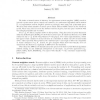Free Online Productivity Tools
i2Speak
i2Symbol
i2OCR
iTex2Img
iWeb2Print
iWeb2Shot
i2Type
iPdf2Split
iPdf2Merge
i2Bopomofo
i2Arabic
i2Style
i2Image
i2PDF
iLatex2Rtf
Sci2ools
ICALP
2004
Springer
2004
Springer
The Black-Box Complexity of Nearest Neighbor Search
We define a natural notion of efficiency for approximate nearest-neighbor (ANN) search in general n-point metric spaces, namely the existence of a randomized algorithm which answers (1 + ε)-approximate nearest neighbor queries in polylog(n) time using only polynomial space. We then study which families of metric spaces admit efficient ANN schemes in the black-box model, where only oracle access to the distance function is given, and any query consistent with the triangle inequality may be asked. For ε < 2 5 , we offer a complete answer to this problem. Using the notion of metric dimension defined in [GKL03] (`a la [Ass83]), we show that a metric space X admits an efficient (1+ε)-ANN scheme for any ε < 2 5 if and only if dim(X) = O(log log n). For coarser approximations, clearly the upper bound continues to hold, but there is a threshold at which our lower bound breaks down—this is precisely when points in the “ambient space” may begin to affect the complexity of �...
Efficient Ann Schemes | ICALP 2004 | Metric Spaces | N-point Metric Spaces | Theoretical Computer Science |
Related Content
| Added | 01 Jul 2010 |
| Updated | 01 Jul 2010 |
| Type | Conference |
| Year | 2004 |
| Where | ICALP |
| Authors | Robert Krauthgamer, James R. Lee |
Comments (0)

